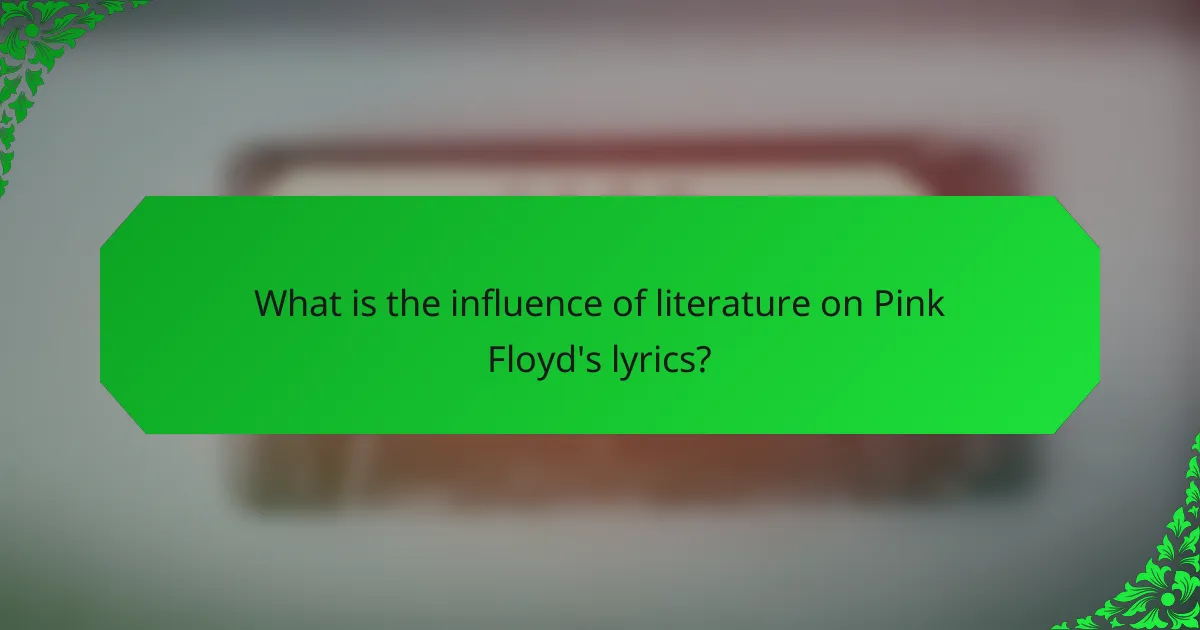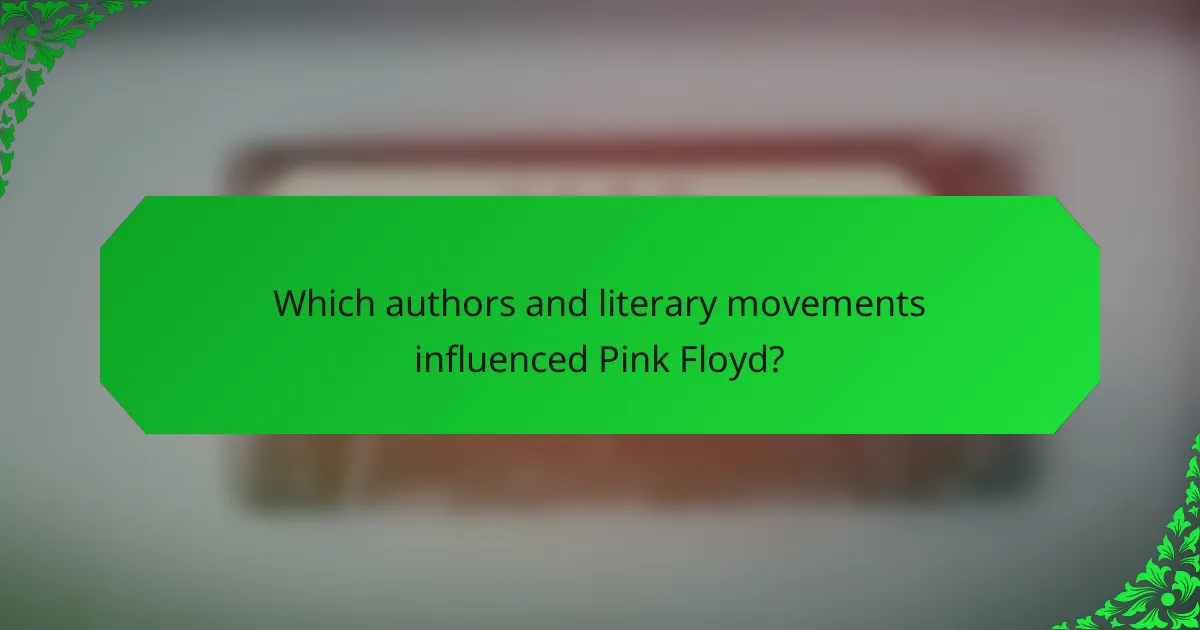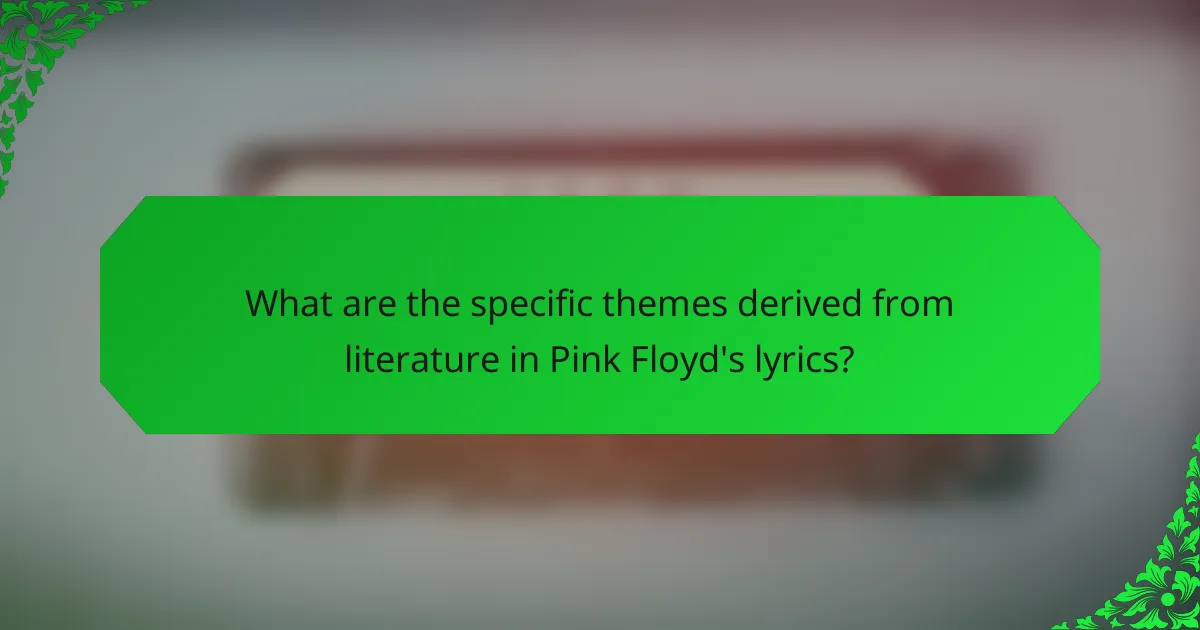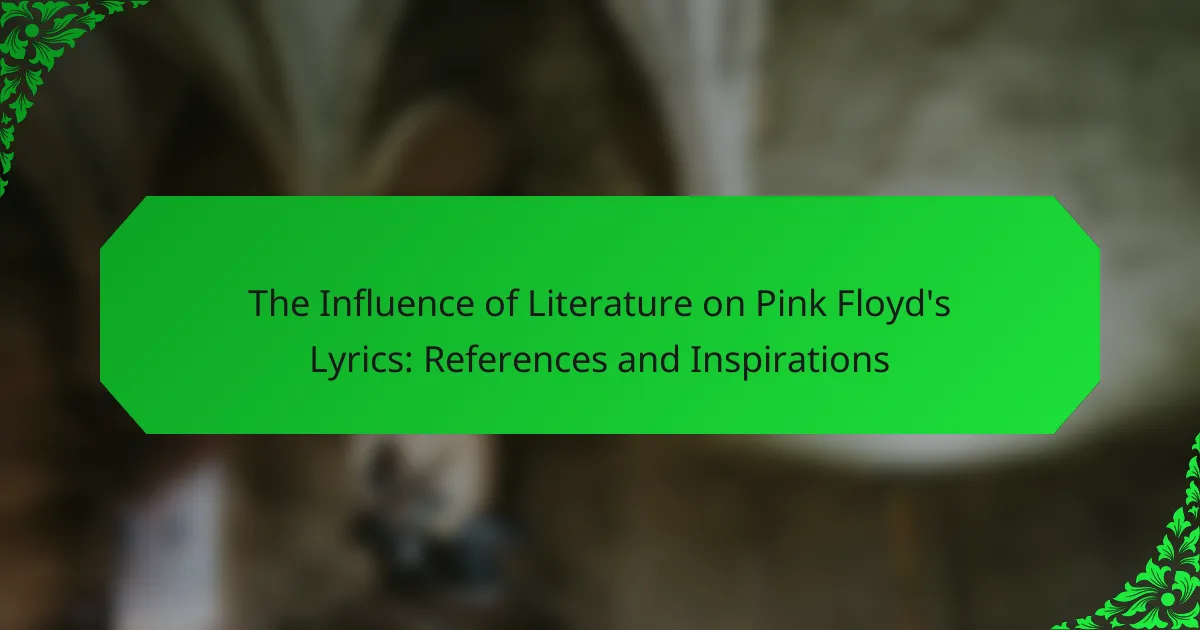The article explores the significant influence of literature on the lyrics of the band Pink Floyd. Key literary figures such as George Orwell and Aldous Huxley are highlighted, illustrating how their works inform themes of control, dystopia, and societal critique in songs like “The Wall” and “Animals.” The article also examines the impact of various literary movements, including Surrealism and Existentialism, on Pink Floyd’s narrative techniques and lyrical depth. Themes of alienation, existentialism, and societal critique are discussed, showcasing the complex relationship between literature and the band’s music. Overall, the article provides a comprehensive overview of how literary sources enrich Pink Floyd’s lyrical content.

What is the influence of literature on Pink Floyd’s lyrics?
Literature significantly influences Pink Floyd’s lyrics. The band draws on various literary sources for inspiration. George Orwell’s “1984” is a notable reference in their work. This influence is evident in the themes of control and dystopia present in songs like “The Wall.” Additionally, Aldous Huxley’s “Brave New World” shapes their exploration of societal issues. The lyrics often reflect existential questions, mirroring literary themes. The band’s use of narrative techniques echoes storytelling found in literature. Overall, literature enriches the depth and complexity of Pink Floyd’s lyrical content.
How has literature shaped the themes in Pink Floyd’s songs?
Literature has significantly shaped the themes in Pink Floyd’s songs. The band often draws on literary influences to explore complex emotions and societal critiques. George Orwell’s “1984” inspired the song “Welcome to the Machine,” highlighting themes of control and dehumanization. Additionally, the works of Aldous Huxley, particularly “Brave New World,” influenced the band’s exploration of dystopian realities. The album “The Wall” reflects themes from literature, including existentialism and isolation, echoing the works of authors like Franz Kafka. Furthermore, the band incorporates poetic elements in their lyrics, showcasing influences from modernist poets. This literary foundation allows Pink Floyd to address profound philosophical questions and human experiences in their music.
What literary works have been explicitly referenced in Pink Floyd’s lyrics?
Pink Floyd’s lyrics explicitly reference several literary works. Notable examples include George Orwell’s “1984” in the song “Animals.” The song “The Wall” draws inspiration from the novel “Brave New World” by Aldous Huxley. Additionally, “The Trial” references Franz Kafka’s “The Trial.” These literary influences demonstrate the band’s engagement with complex themes and societal critiques.
How do literary themes resonate within Pink Floyd’s music?
Literary themes resonate within Pink Floyd’s music through exploration of existentialism, alienation, and societal critique. Their album “The Wall” embodies themes of isolation and psychological trauma. The lyrics reflect a narrative similar to George Orwell’s “1984,” emphasizing totalitarianism and personal struggle. In “Dark Side of the Moon,” themes of time and mental health align with literary works like Virginia Woolf’s writings. The song “Comfortably Numb” illustrates emotional detachment, echoing literary depictions of disconnection. Pink Floyd’s use of storytelling aligns with narrative techniques found in classic literature, enhancing the depth of their music. Their work often invites listeners to reflect on human experience, paralleling the introspective nature of literary themes.
Why is literature important to understanding Pink Floyd’s artistic expression?
Literature is important to understanding Pink Floyd’s artistic expression because it provides context and depth to their lyrics. The band’s work often reflects themes found in literary texts. For example, George Orwell’s “1984” influenced the song “Animals.” Additionally, the existential themes in Franz Kafka’s works resonate in albums like “The Wall.” Literary references enrich the emotional landscape of their music. They allow listeners to connect with broader human experiences. Understanding these literary connections enhances the appreciation of Pink Floyd’s artistry. Thus, literature serves as a crucial lens for interpreting their complex narratives.
What role does storytelling play in Pink Floyd’s lyrics?
Storytelling plays a crucial role in Pink Floyd’s lyrics. Their songs often explore complex narratives and themes. For instance, “The Wall” tells the story of a character’s psychological struggles. This narrative approach allows for deep emotional engagement. The lyrics convey personal and societal issues through vivid imagery. Pink Floyd’s storytelling often reflects broader human experiences. Their songs frequently incorporate allegory and metaphor. This enhances the listener’s connection to the music. Overall, storytelling is integral to the band’s lyrical identity.
How does literary analysis enhance the listening experience of Pink Floyd’s music?
Literary analysis enhances the listening experience of Pink Floyd’s music by providing deeper insights into the themes and narratives within their lyrics. Pink Floyd’s songs often incorporate complex literary references and storytelling techniques. Analyzing these elements reveals layers of meaning that enrich the listener’s understanding. For example, the album “The Wall” draws heavily from literary influences like George Orwell’s “1984.” This connection adds a socio-political context to the music. Additionally, exploring the symbolism and imagery in their lyrics allows listeners to engage emotionally and intellectually. This multifaceted approach transforms passive listening into an active, reflective experience. Thus, literary analysis serves as a tool for uncovering the profound messages embedded in Pink Floyd’s work.

Which authors and literary movements influenced Pink Floyd?
Pink Floyd was influenced by various authors and literary movements. Key influences include George Orwell, whose dystopian themes resonate in their work. Aldous Huxley’s “Brave New World” also shaped their exploration of societal issues. The Surrealist movement inspired their abstract and dreamlike imagery. Additionally, the Beat Generation impacted their lyrical style and themes of rebellion. The existentialist philosophy found in the works of Jean-Paul Sartre influenced their contemplation of existence. These literary influences contributed to the depth and complexity of Pink Floyd’s lyrics.
What specific authors have inspired Pink Floyd’s lyrics?
Pink Floyd’s lyrics have been inspired by several specific authors. Notable influences include George Orwell, whose themes in “1984” resonate in Pink Floyd’s exploration of dystopia. Aldous Huxley is another significant figure, particularly his novel “Brave New World,” which parallels the band’s commentary on society. Additionally, the poetry of T.S. Eliot has shaped their lyrical depth, especially in works like “The Waste Land.” The philosophical writings of Friedrich Nietzsche have also inspired their existential themes. These authors have contributed to the band’s complex narratives and emotional depth in their music.
How do the works of George Orwell appear in Pink Floyd’s music?
George Orwell’s works appear in Pink Floyd’s music primarily through themes of dystopia and authoritarianism. The album “Animals” reflects Orwell’s “Animal Farm” by using animal allegories to critique societal structures. Songs like “Pigs (Three Different Ones)” represent corrupt leaders, mirroring Orwell’s commentary on political power. Additionally, “The Wall” embodies Orwellian ideas of isolation and control, akin to “1984.” The lyrics explore the psychological effects of oppressive systems, paralleling Orwell’s narratives. Overall, Pink Floyd channels Orwell’s critique of totalitarianism and societal decay in their music.
What connections can be drawn between existentialism and Pink Floyd’s themes?
Existentialism and Pink Floyd’s themes share a profound connection through the exploration of human existence and consciousness. Pink Floyd’s lyrics often reflect existential questions about identity, freedom, and the absurdity of life. Songs like “Time” and “The Great Gig in the Sky” delve into the passage of time and the inevitability of death, key concerns in existential philosophy. The band’s album “The Wall” illustrates feelings of isolation and alienation, echoing existentialist ideas about the individual’s struggle in an indifferent world. Additionally, the use of surreal imagery in their music encapsulates the existential quest for meaning in a chaotic universe. Overall, Pink Floyd articulates existential themes by questioning reality and emphasizing personal experience, aligning closely with existentialist thought.
How do different literary movements reflect in Pink Floyd’s work?
Different literary movements significantly influence Pink Floyd’s work. The band’s lyrics often reflect themes from surrealism, existentialism, and dystopian literature. Surrealism is evident in songs like “Echoes,” which features dream-like imagery and abstract concepts. Existentialism shapes tracks such as “Comfortably Numb,” exploring themes of alienation and the human condition. Dystopian elements are prominent in “The Wall,” which critiques societal norms and the loss of individuality. The band’s use of narrative structure in albums aligns with modernist literary techniques. Overall, Pink Floyd’s work embodies a rich tapestry of literary influences, enhancing their lyrical depth and thematic complexity.
What elements of surrealism can be found in Pink Floyd’s lyrics?
Pink Floyd’s lyrics exhibit several elements of surrealism. Their use of dreamlike imagery creates a sense of disorientation. For instance, lyrics often include bizarre and illogical scenarios. This evokes the unconscious mind, a key aspect of surrealism. Additionally, they employ abstract language that challenges conventional meaning. Songs like “Echoes” showcase fragmented narratives that defy linear storytelling. The blending of reality and fantasy is prevalent throughout their work. These elements reflect the influence of surrealist literature and art. Overall, Pink Floyd’s lyrics embody surrealism through vivid imagery and unconventional structure.
How does the counterculture of the 1960s influence their literary references?
The counterculture of the 1960s significantly influenced literary references in various works. This period emphasized themes of rebellion, individualism, and social change. Authors like Jack Kerouac and Allen Ginsberg became central figures, shaping the literary landscape. Their works often reflected the ideals of freedom and anti-establishment sentiments prevalent in the counterculture. Pink Floyd’s lyrics, for instance, echo these themes through references to existentialism and surrealism. The band’s incorporation of literary elements enhances the emotional depth of their music. Additionally, the use of vivid imagery in their lyrics draws inspiration from the era’s literary styles. This connection illustrates how the counterculture’s values permeated literary expression during that time.

What are the specific themes derived from literature in Pink Floyd’s lyrics?
Specific themes derived from literature in Pink Floyd’s lyrics include alienation, existentialism, and the critique of society. Alienation is often portrayed through characters feeling disconnected from reality. Existentialism reflects the search for meaning in a chaotic world. The critique of society addresses issues like war, materialism, and mental health. These themes resonate with literary works, enhancing the depth of the lyrics. For example, “The Wall” explores isolation, paralleling themes in Kafka’s works. Similarly, “Animals” critiques capitalism, echoing Orwell’s “Animal Farm.” Such literary influences enrich the band’s narrative and emotional complexity.
How do themes of alienation and isolation manifest in their songs?
Themes of alienation and isolation manifest in Pink Floyd’s songs through introspective lyrics and haunting melodies. The band often explores feelings of detachment from society and personal struggles. For example, in “Comfortably Numb,” the protagonist experiences a profound sense of disconnection from reality. The lyrics evoke a feeling of being trapped in one’s mind, highlighting emotional isolation. Similarly, “Wish You Were Here” reflects the longing for connection and the pain of absence. This song addresses the alienation felt by the band members, particularly in relation to their former bandmate Syd Barrett. Overall, Pink Floyd’s music captures the complexities of human emotions related to isolation and alienation.
What literary references support the theme of alienation in Pink Floyd’s music?
Pink Floyd’s music frequently references literary works that underscore the theme of alienation. One notable reference is George Orwell’s “1984.” The band’s song “Animals” draws parallels to Orwell’s depiction of societal control and dehumanization. Another significant literary influence is the works of Franz Kafka, particularly “The Metamorphosis.” This story’s themes of isolation and existential dread resonate in Pink Floyd’s explorations of personal and societal estrangement. Additionally, the poetry of W.H. Auden, especially his focus on the human condition, informs the band’s lyrical narrative. These literary connections reinforce the pervasive sense of alienation present in Pink Floyd’s music.
How does the concept of madness appear in their lyrics?
The concept of madness prominently appears in Pink Floyd’s lyrics through themes of psychological distress and existential crisis. Songs like “Brain Damage” explore the fragility of mental health and societal perceptions of insanity. The lyrics depict a struggle between sanity and madness, reflecting the band’s own experiences and observations. Additionally, “The Wall” portrays isolation and the impact of trauma on the mind. This thematic exploration is rooted in literary influences, particularly from works like George Orwell’s “1984,” which examine the human condition under oppressive circumstances. The band’s use of vivid imagery and metaphor further illustrates the chaotic nature of mental turmoil, making madness a central motif in their artistic expression.
What is the significance of dystopian imagery in Pink Floyd’s lyrics?
Dystopian imagery in Pink Floyd’s lyrics serves to critique societal issues and human experiences. This imagery reflects themes of alienation, oppression, and existential despair. For example, the song “Another Brick in the Wall” illustrates the dehumanizing effects of the educational system. The lyrics depict a world where individuality is suppressed. Similarly, “The Wall” explores psychological isolation and the consequences of emotional trauma. Pink Floyd uses these vivid images to evoke strong emotional responses. The band’s approach resonates with listeners by highlighting the darker aspects of modern life. This significance lies in its ability to provoke thought and inspire change through powerful storytelling.
How do dystopian themes reflect the literary influences on Pink Floyd?
Dystopian themes in Pink Floyd’s work reflect significant literary influences, particularly from George Orwell and Aldous Huxley. The band’s lyrics often explore oppressive societal structures and individual alienation. For example, “The Wall” draws on the themes of isolation and authoritarianism found in Orwell’s “1984.” The song “Another Brick in the Wall” critiques the education system, paralleling Orwellian concepts of control. Additionally, Huxley’s “Brave New World” influences the band’s portrayal of a technologically dominated society. The song “Welcome to the Machine” embodies this critique of dehumanization in modern life. These literary references provide a framework for understanding Pink Floyd’s exploration of dystopian realities.
What specific songs illustrate dystopian narratives inspired by literature?
“Another Brick in the Wall, Part 2” by Pink Floyd illustrates dystopian narratives inspired by literature. The song critiques the educational system and societal conformity. It draws inspiration from George Orwell’s themes in “1984.” The oppressive nature of authority is a central theme in both the song and the novel. “Welcome to the Machine” also reflects dystopian elements. It embodies a critique of dehumanization in a mechanized society. This aligns with themes found in Aldous Huxley’s “Brave New World.” “Dogs” critiques capitalism and societal greed. This resonates with the dystopian warnings in various literary works. Each song showcases a distinct narrative that reflects literary influences.
What practical insights can be drawn from the literary influences on Pink Floyd’s lyrics?
Literary influences on Pink Floyd’s lyrics reveal themes of existentialism, alienation, and human experience. Works by authors like George Orwell and Aldous Huxley inspired critiques of society. For instance, “The Wall” reflects themes from Orwell’s “1984.” The lyrics explore isolation and the impact of oppressive systems. Additionally, the surrealism in Lewis Carroll’s writings influenced the band’s abstract imagery. The song “Echoes” showcases this with its dreamlike narrative. These literary references provide depth to the band’s messages, enhancing emotional resonance. They also encourage listeners to engage with complex philosophical ideas. Overall, Pink Floyd’s lyrics serve as a bridge between literature and music, enriching both forms of art.
How can listeners apply literary analysis to deepen their appreciation of Pink Floyd’s music?
Listeners can apply literary analysis to deepen their appreciation of Pink Floyd’s music by examining the themes, symbols, and narratives present in their lyrics. Analyzing the lyrics reveals connections to literary works, such as George Orwell’s “1984” and Aldous Huxley’s “Brave New World.” These connections enhance understanding of the band’s critique of society and human experience. Identifying literary devices like metaphor and imagery in songs, such as “The Wall,” provides insight into emotional depth and storytelling techniques. Additionally, exploring the historical context of the lyrics enriches the listener’s interpretation of the music. By engaging with these literary elements, listeners can uncover layers of meaning and appreciate the artistry behind Pink Floyd’s compositions.
What resources are available for exploring the literary connections in Pink Floyd’s lyrics?
Books analyzing Pink Floyd’s lyrics include “The Dark Side of the Moon: The Making of the Pink Floyd Masterpiece” by John Harris. This book provides insights into the band’s literary influences. Additionally, “Pink Floyd and Philosophy” edited by Jennifer Hartman explores philosophical themes in their music. Academic journals such as “Popular Music” often publish articles on Pink Floyd’s literary connections. Websites like Genius offer annotated lyrics that highlight literary references. Documentaries like “Pink Floyd: The Story of Wish You Were Here” also discuss literary inspirations. These resources collectively facilitate a deeper understanding of the literary connections in Pink Floyd’s lyrics.
The main entity of the article is the influence of literature on Pink Floyd’s lyrics, highlighting key literary references and inspirations. The article explores how authors like George Orwell and Aldous Huxley shape the band’s themes of control, dystopia, alienation, and existentialism. It discusses specific songs that illustrate these literary connections, such as “The Wall” and “Animals,” and examines the broader implications of storytelling and narrative techniques in their music. Additionally, it outlines the significance of literary analysis in enhancing the listener’s appreciation of Pink Floyd’s artistic expression.
